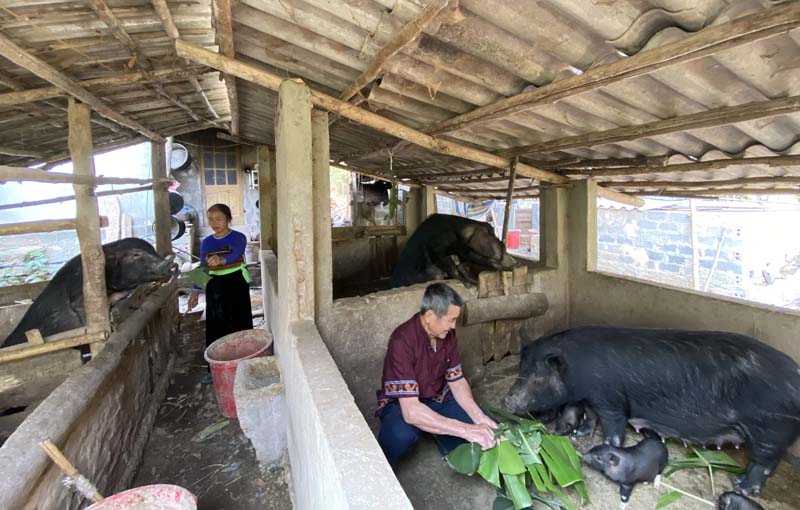
(HBO) - Despite raising black pig (an indigenous variety) for long, it’s only when joining the Muong Pa local pig breeding cooperative did member households in Xam Khoe and Bao La communes in Mai Chau district have chances to gain access to the commodity economy.
 Member households of Muong Pa indigenous pig breeding
cooperative in Xam Khoe commune (Mai Chau district) ensure a sufficient source
of piglets to reduce production costs and increase income.
Member households of Muong Pa indigenous pig breeding
cooperative in Xam Khoe commune (Mai Chau district) ensure a sufficient source
of piglets to reduce production costs and increase income.
Indigenous pigs are favoured by consumers thanks
to its delicious meat. To have high-quality products, the quality of piglets is
a decisive factor. Member households know that to participate in the commodity
economy, they have to take the initiative in the supply of piglets and feed.
Specifically, the supply of piglets is ensured by cooperative members by keeping
sows, while the main feed for pigs includes "rau duong” (Diplazium esculentum),
sweet potato, taro, colocasia gigantean and banana trunk, which are planted in
a large scale of thousands of square metres. Mash for pigs and veterinary medicine
are provided by the cooperative.
Member households are equipped with technical
guidance and knowhows to prevent diseases, therefore, the quality of pork is
ensured.
According to statistics, the cooperative is
raising a herd of 120-150 hogs and 20 sows. With active supply of piglets and
foodstuff and common breeding methods, member households can enjoy 65-70
percent in profits. In addition to connecting with a mash production company,
the cooperative has supported member households in seeking consumption markets.
Specially, through the help of the GNI in Vietnam, the cooperative has recently
put into operation a slaughterhouse which comprises of areas for breeding,
slaughter, semi-processing and waste treatment with a designed capacity of 20
hogs a day.
With the application of on-spot production,
semi-processing and food safety measures, Muong Pa cooperative eyes bigger and
more stable markets. The cooperative’s director said that it is striving to
have more members to develop further, thus contributing to helping indigenous pig
raising households access potential markets and gain stable livelihoods./.
Hoa Binh province’s economy posted an impressive Gross Regional Domestic Product (GRDP) growth rate of 12.67% in the first quarter of 2025, representing a 12.76% year-on-year increase, the highest rate recorded since the beginning of the current tenure, according to the provincial Statistics Office. This robust growth reflects years of strategic groundwork and sets a strong foundation for the province’s annual growth target of over 10%.
With a focus on cash crop farming with science - technology application and brand building, Lac Thuy district is gradually increasing production value, improving people's life quality, and laying the foundation for sustainable socio-economic development.
In recent years, the economic development model "Hoa Binh Earthworm Farm” run by Mr. Bui Van Dang in Co Giua Hamlet, My Thanh Commune (Lac Son district) has not only brought stable economic value but it is also environmentally friendly, helping to protect and reduce pollution, contributing to the construction of a green and sustainable agriculture.
Dao Village’s honey – a product certified with a 3-star OCOP (One Commune One Product) rating by Thong Nhat Agricultural Cooperative in Dao Village (Hoa Binh City) – is highly regarded by consumers for its quality, richness, and variety in packaging. The distinctively sweet taste of Dao Village’s honey leaves a lasting impression on anyone who has tried it.
In alignment with Project No. 07-DA/TU, issued by the Hoa Binh provincial Party Committee on November 1, 2021, Lac Thuy district has actively promoted investment and supported the sustainable development of its industrial and handicraft sectors during the 2021–2025 period. Alongside this, the district has remained committed to preserving and revitalising traditional craft villages.
Located in the northern part of Lac Thuy district, with a temperate climate and fertile soil, Phu Thanh commune has great potential and advantages in growing tea. The long-standing experience, combined with strict adherence to organic farming practices in the tea gardens, ensures that the dried tea products from Phu Thanh and Lac Thuy as a whole are sold out immediately upon production, providing a stable and prosperous life for the local people.



 Member households of Muong Pa indigenous pig breeding
cooperative in Xam Khoe commune (Mai Chau district) ensure a sufficient source
of piglets to reduce production costs and increase income.
Member households of Muong Pa indigenous pig breeding
cooperative in Xam Khoe commune (Mai Chau district) ensure a sufficient source
of piglets to reduce production costs and increase income.